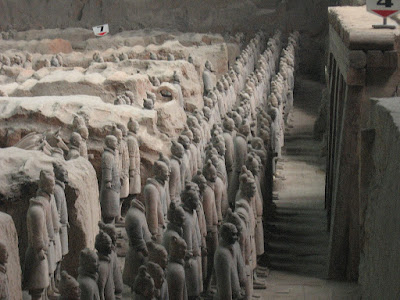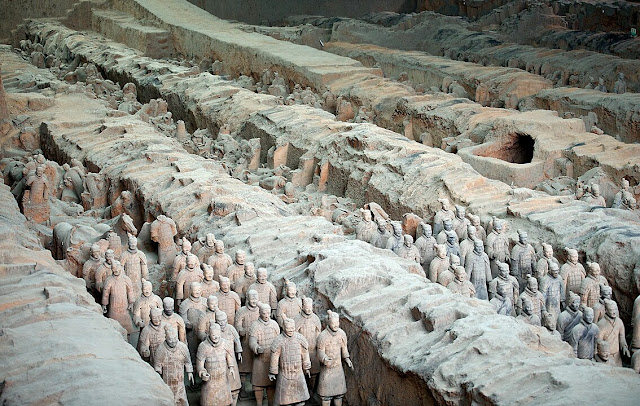Eighth Wonder of the World
There are a few considered for the title.
Four are listed here. They are constructions rather than natural wonders.
Pre-1900 creations
Part Eight
The Taj Mahal 'Crown of the Palace') is an
ivory-white marble mausoleum on
the bank of the river Yamuna in Agra, Uttar Pradesh,
India. It was commissioned in 1631 by the fifth Mughal emperor, Shah Jahan (r. 1628–1658)
to house the tomb of his beloved wife, Mumtaz Mahal; it
also houses the tomb of Shah Jahan himself. The tomb is the centrepiece of a
17-hectare (42-acre) complex, which includes a mosque and a guest house, and is
set in formal gardens bounded on three sides by a crenellated wall.
Construction of the mausoleum was completed in 1648, but work continued on other phases of the project for another five years.
There are many myths surrounding it, including that it was actually built in the 12th century. That it was designed by a Frenchman, another claims a Spaniard, an Italian and another by a Hindu King. No concrete evidence exists for claims that describe, often in horrific detail, the deaths, dismemberment and mutilations which Shah Jahan supposedly inflicted on various architects and craftsmen associated with the tomb.
Photo - Muhammad Mahdi Karim - Own work, GFDL 1.2, https://commons.wikimedia.org/w/index.php?curid=23199927
The Taj Mahal is a major tourist attraction and attracts approximately
five million visitors a year.
The Terracotta Army
The Terracotta Army is a collection
of terracotta sculptures
depicting the armies of Qin
Shi Huang, the first emperor
of China. It is a form of funerary
art buried with the emperor in 210–209 BCE with the purpose of
protecting him in his afterlife.
The figures, dating from approximately the late 200s BCE, were
discovered in 1974 by local farmers.
 |
| GFDL, CC BY-SA 3.0, https://commons.wikimedia.org/w/index.php?curid=2103826 |
The figures vary in height according to their rank, the
tallest being the generals. The figures include warriors, chariots and horses. Estimates from
2007 were that the three pits containing the Terracotta Army hold more than
8,000 soldiers, 130 chariots with 520 horses, and 150 cavalry horses. Other,
non-military figures have since been found in other pits, including those of
officials, acrobats, strongmen, and musicians.
.jpg) |
| By kevinmcgill from Den Bosch, Netherlands - KAM_5048, CC BY-SA 2.0, https://commons.wikimedia.org/w/index.php?curid=31690639 |
The Thames Tunnel
The Thames Tunnel is a tunnel beneath
the River Thames in London, connecting Rotherhithe and Wapping. It
measures 35 ft (11 m) wide by 20 ft (6.1 m) high and is
1,300 ft (400 m) long, running at a depth of 75 ft (23 m)
below the river surface measured at high tide. It is the first tunnel known to
have been constructed successfully underneath a navigable river. It was
built between 1825 and 1843 by Marc Brunel, and his son, Isambard.
The tunnel was originally designed for horse-drawn
carriages, but was mainly used by pedestrians and became a tourist attraction.
In 1869 it was converted into a railway tunnel.
 |
| By Lars Plougmann from United States - Thames Tunnel walk, CC BY-SA 2.0, https://commons.wikimedia.org/w/index.php?curid=11606054 |
Bonus - One more for the simple thrill of it. This is the Victoria Bridge in Montreal, Canada. It opened in 1859 and spans the St. Lawrence River.
Human beings can be quite amazing afterall!
.jpg) |
| Photo 1901 |
This is the last in this series. I hope you enjoyed them.
Peace
Anthony

.jpg)

.jpg)

.jpg)


Wow. Impressive.
ReplyDeleteHugs, friend. Take care.